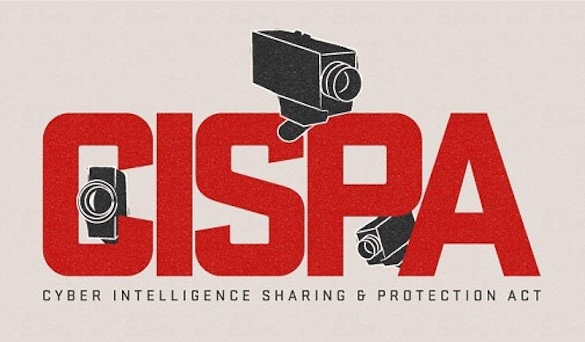The Internet’s biggest organizations collectively rose up in outrage over a potential act of government censorship, yet have been conspicuously silent as Congress mulls sweeping new government surveillance authority. In 2012, most major websites staged a massive global blackout in protest of the Stop Online Piracy Act (SOPA), which would have granted authority to shut down websites associated with piracy. Yet as congress considers broad new sensitive data-sharing rules under the eerily named, Cyber Intelligence Sharing and Protection Act (CISPA), there is not even a hint of outrage. The deafening silence reveals a culture within Silicon Valley that cares far more about information than civil liberties.
A Muted Meeting With Obama Over Surveillance
According to those who attended a recent meeting between top tech CEOs and President Obama, the consensus was that the government should have a “light touch” over their data sharing practices. CISPA would grant immunity to top Internet sites for sharing personal information that aids authorities in combating malicious cyber threats. The bill’s original mandatory safety provisions have been slimmed down to voluntary guidelines after tech and business-friendly legislators blocked the requirements as overly-burdensome.
But, on the subject of civil liberties, there seems to be little concern.
Big Business Likes CISPA, But Why Other Big Orgs?
The legal entitlements to big companies make it easy to see why they have a vested interest in supporting CISPA, but why no outrage from other web organizations that protested SOPA? Alexis Ohanian, founder of the widely popular aggregator, Reddit, explained to me why he hasn’t seen the same reaction from his community over privacy concerns,
“The big reason is the imminent threat of shutting down things we love (like reddit, all of social media etc) that sopa/pipa provided. Whereas the obliteration of 4th amendment rights to privacy online isn’t as blatant, sadly, so it’s harder to rally around,” he writes.
Information Over Individualism
However, Ohanian’s argument doesn’t fully explain the lack of outrage, given that the Internet community has risen up over other issues. When Washington D.C. tried to impose fees on beloved car-ride sharing service Uber, tech blogs and twitter lit were incensed. “Wow, a business (Uber) is prevented from lowering its prices.. wait.. what? We live in America, right?” tweeted Google Venture Partner, and Digg Co-Founder, Kevin Rose.
The same Internet flash lobby has spontaneously organized over free access to academic research, a Wikipedia slander law in Malaysia, and a sedition law in the Philippines.
The truth is, web culture is far more attached to the free flow of information than notions of individualism. The web is founded on interdependence, innovation, and discovery. These are the values that ignite the passions of those who create (and control) the World Wide Web. Civil liberties are a concern, but don’t trigger the same sense of urgency. Privacy, ownership, sovereignty, expression, and choice, will all be overshadowed by transparency, sharing, global citizenship, and wisdom.
Government watchdog groups can try to spark protest all they want, but the actions of the Internet community has already spoken: civil liberties are not a priority.
Read more of this argument at The Washington Post.
[Image: Lumin Consulting]
